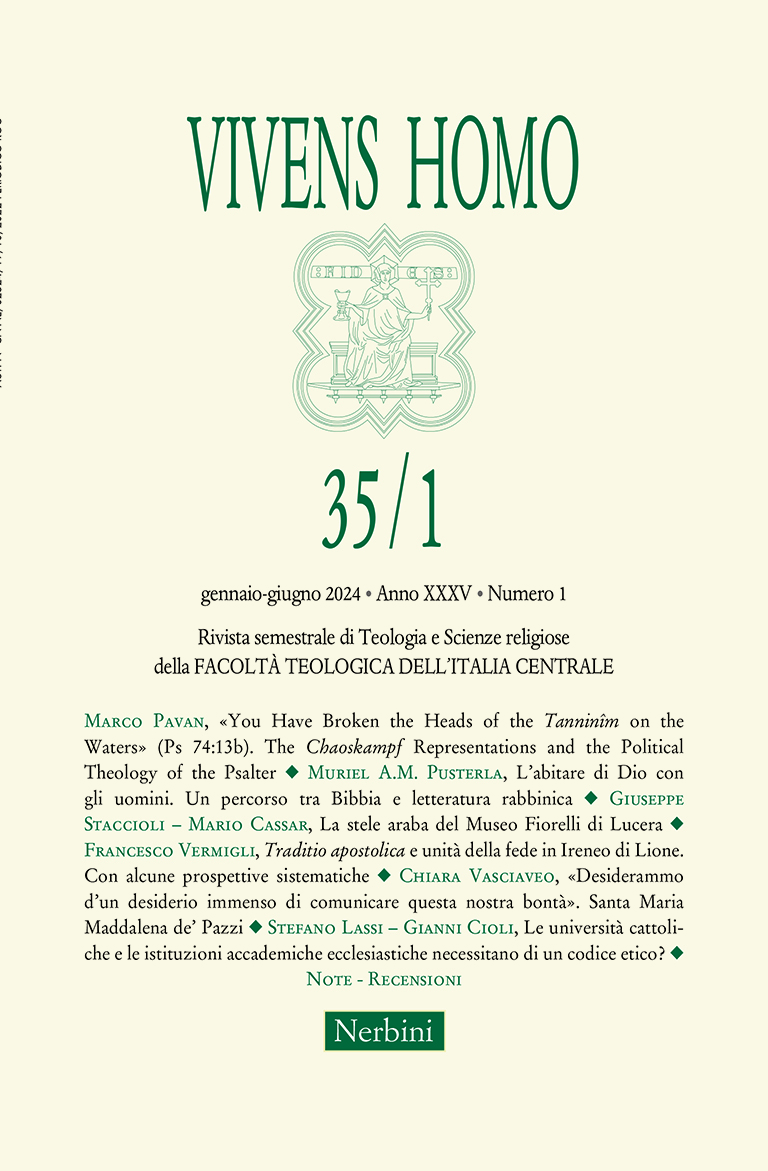Vivens homo 35/1
Rivista semestrale di Teologia e Scienze religiose della Facoltà Teologica dell’Italia Centrale
Contributi di Marco Pavan, Muriel A.M. Pusterla, Giuseppe Staccioli e Mario Cassar, Francesco Vermigli, Chiara Vasciaveo, Stefano Lassi e Gianni Cioli, Stefano Tarocchi, Angela Guglielmi, Placido Maria Imparato, Angelo Pellegrini, Giovanni Leoncini
Compra su Nerbini.it
Vivens homo 35/1
Marco Pavan
«You Have Broken the Heads of the Tanninîm on the Waters» (Ps 74:13b). The Chaoskampf Representations and the Political Theology of the Psalter
Abstract
È ben noto alla ricerca il fatto che alcuni passaggi dell’AT descrivono la creazione come una battaglia del Re divino contro le forze del caos primordiale (Chaoskampf). Questo tipo di rappresentazioni si basa sull’idea che la sfera politica venga, in qualche modo, qualificata da quella religiosa. Tra i loci veterotestamentari nei quali il Chaoskampf assume una posizione di rilievo ci sono, senza dubbio, i salmi, testi nei quali preghiera, poesia, mito e teologia politica si intrecciano indistricabilmente. Nel presente contributo, dopo una prima ricognizione della ricerca sul tema del Chaoskampf e sul rapporto tra linguaggio mitopoietico e teologia politica, uno sguardo particolare viene offerto sul Sal 74,12-17, uno dei passaggi comunemente ascritti a questo genere di rappresentazioni. L’inno contenuto in questi versetti costituisce una risposta alla crisi dell’alleanza causata dalla «fine delle mediazioni» (tempio e re) lamentata nella prima parte del poema, formulata sulla base del tentativo di ripercorrere a ritroso il cammino fino all’origine del nesso tra Dio e il suo popolo e aprire l’orizzonte alla speranza nel ristabilimento futuro di tali mediazioni (cf. Sal 89,47-52). L’idea portante di entrambi i moti – all’indietro e in avanti – è la fede nel dominio del Re divino sulla creazione e sulla storia umana.
It is a well-known datum of Biblical scholarship that some OT passages describe the creation as a battle of the divine King against the primeval chaos (Chaoskampf). Such descriptions are based on the idea of the influence of the religious on the political sphere. The Chaoskampf representations are particularly prominent in the Psalms, where prayer, poetry, myth, and political theology are strictly intertwined. In the present contribution, I try to explore the relationships between the Chaoskampf, mythopoetic language, and political theology. After paying attention to the scholarly research in this field, I devote my analysis to Ps 74:12-17, a hymn meant to address the end of the covenant between God and Israel caused by the «end of the mediators» (the king and the temple) and lamented in the first part of the poem. These verses track back the history of the covenant to their very origins, and, in so doing, they open the horizon of hope for future restoration (cf. Ps 89:47-52). The backbone of the theological vision of Ps 74:12-17 is the faith in the dominion of the divine King over creation and human history.
M. Pavan, «You Have Broken the Heads of the Tanninîm on the Waters» (Ps 74:13b). The Chaoskampf Representations and the Political Theology of the Psalter, in Vivens Homo 35/1 (2024), 5-36
